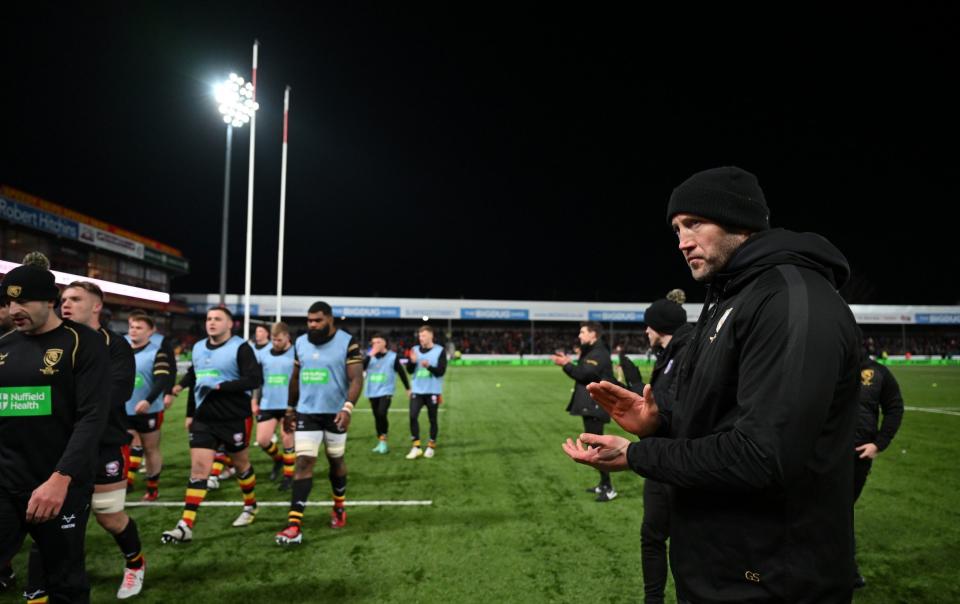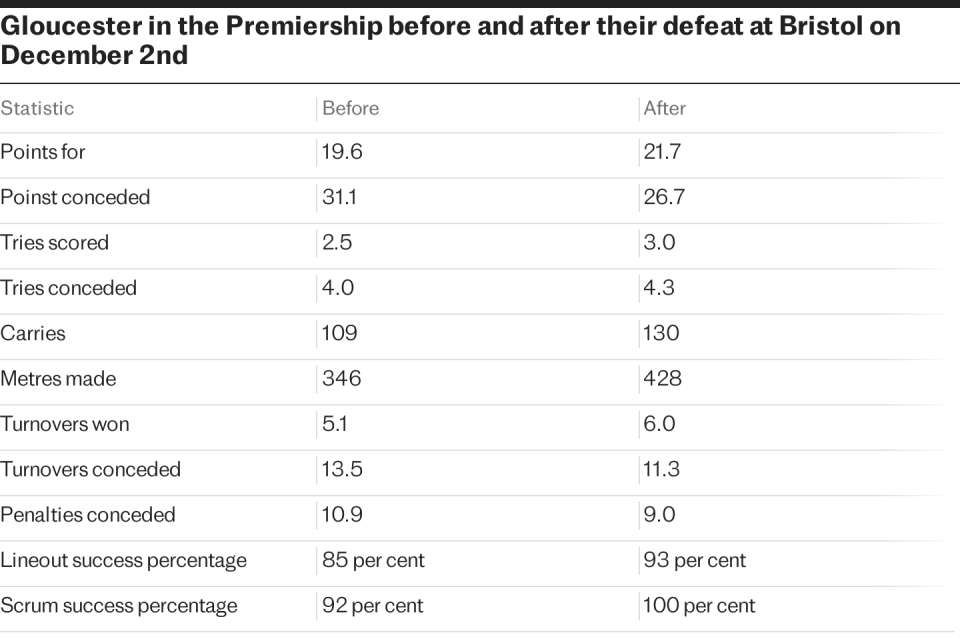With two wins in eleven Gallagher Premiership games and the play-offs now a dot on the horizon, this was clearly not the season Gloucester had in mind. Telegraph Sport reveals how a mid-season reset has put the Cherry and Whites back on track ahead of Sunday’s clash with Sale Sharks
A plethora of injuries during the previous campaign saw Gloucester fall out of play-off contention in spectacular fashion, finishing 10th, leaving the club looking for a solution. George Skivington, the club’s head coach, devised a plan with the club’s medical and strength and conditioning staff over the summer to try to keep more Gloucester players on the field and out of the medical room, while also boosting the club’s attack would take the club to a new level. level.
This meant that the players’ workload during training was reduced with an emphasis on rest and recovery. The focus of the previous season was on improving Gloucester’s meters after contact – gaining ground after the initial collision between attacker and defender. The team’s defense and set piece were strong and they had plenty of pace out wide, but their ball carrying needed work. By focusing on that area, Gloucester finished the 2022-23 season as the league’s best side in terms of meters after contact, but it came at a price. The club suffered 13 frontline injuries, hence the desire last summer to tone things down in training by, as Skivington tells Telegraph Sport, “removing some of the banging, the running into the ground movements.” to take”. Reduce the number of collisions, reduce the number of injuries – on paper it makes sense.
A record 51-26 away defeat at Bristol in early December led to Skivington and his coaches making a decision on their new approach; they had gone too far. Gloucester still had injuries to key staff, but the overall number was down. The intensity of the team was crucial.
Those plans to move the attack forward were also shattered when three of Gloucester’s key ball carriers – Val Rapava-Ruskin, Ruan Ackermann and new signing Zach Mercer – suffered injuries. While Jack Clement in the back row performed admirably in their absence, the void left by these carriers and the slowness to find other ways to attack was something Gloucester “didn’t adapt quickly enough”.
Skivington continued: “I thought we could keep going through it and it probably got worse week by week. It took that away game in Bristol for me to step back and say, ‘We’ve really lost our way here, we don’t look like the Gloucester team we’ve built over the last few seasons.’


After the humiliation at Bristol and after consulting his coaching mentors – Stuart Lancaster, Warren Gatland and former Wales coach and head of elite coach development at the RFU, Kevin Bowring – Skivington informed the players at a team meeting on Monday that the club was on its way to the next step. reset button and go back to the principles of previous seasons: strong platoon, stingy defense, plenty of kicks. The focus on improving the attack had led to other areas being left behind. Gloucester’s maul, overseen by Skivington, once produced 46 tries per season. In this campaign they only managed to make a handful of them.
“I’ve had countless Premier League coaches say to me after games: ‘Why have you stopped kicking the ball so much?’ because it was a threat. People, not players, always say can we kick the ball less, but actually we are now the team that kicks the ball the least and that affects us,” Skivington explains.
“I really believe that the attack will continue. We just didn’t need it as much as we thought. Northampton are now kicking the ball more than anyone else and are suddenly at the top of the table after all the good work they have done with their attack. The game stats are pretty clear on what you need to do to become a top Premier League team, and we’ve deviated from that. Lose the guys with the natural ability to get over the winning line and rugby becomes very difficult. I learned my lesson the hard way.”


The loss of Adam Hastings to a new knee injury has been particularly cruel for both player and club, and the extent of his latest setback has yet to be made public. The Scotland flyhalf’s contract expires at the end of the season. When asked if he could be retained, like Rapava-Ruskin this week, Skivington sounds torn. “I love Adam, we have a very good relationship. I’d like to keep him in the building. Let’s face it, there is the side that we have been really hurt by having young halfbacks over the last year, and we have to be pragmatic about that. That’s a balance. The discussions will now take a different turn. He’s a great guy and so talented that he might be a little too brave for his own good.”
Not to mention Louis Rees-Zammit’s shocking departure to the NFL two weeks ago. When the release of his contract was agreed, Rees-Zammit told Skivington that Gloucester’s victory in Edinburgh would be the last rugby match he ever played. “That’s quite a big statement, I thought, but he’s absolutely convinced that this is the route he’s going down,” Skivington added, emphasizing that Rees-Zammit has gone with the club’s blessing. Losing a Test wing with the world at his feet is undoubtedly a hammer blow, but Gloucester has been hit with many of those in recent years, including Ed Slater’s ALS diagnosis, and has picked itself up again. “These guys are just performing well. They stick with it.”
Since that turning point in Bristol, wins have come in Europe – four in a row – and Gloucester has come very close in the Premier League, losing three bonus points. Statistically, all key metrics have improved. “I can live with that [narrow defeats] when I see the team show what we stand for,” notes Skivington.
Perhaps Sunday will be the time for Gloucester to record their first league win since October 20. Trying to change your strategy is commendable. Having the clarity to recognize when those changes have failed is even more admirable and could ultimately save their season.